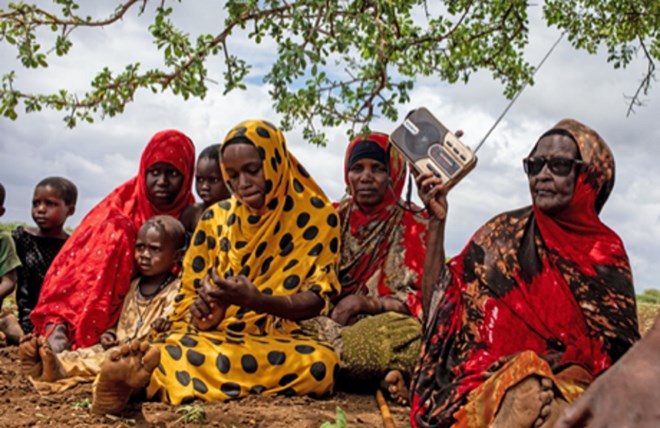
Tuesday October 26, 2021
 Episodes in the programme to focus on the impact of climate change on food security
Episodes in the programme to focus on the impact of climate change on food security
26 October 2021, Mogadishu – The Food and Agriculture Organization of the United Nations (FAO) in Somalia, has launched a new cycle of radio programmes. The programmes, which will focus on Climate-Smart Agriculture, will be an extension of the radio training modules, which FAO launched here last year to adapt to COVID-19 constraints. Climate Smart Agriculture is an approach that helps to guide actions needed to transform and reorient agricultural systems to effectively support development and ensure food security in a changing climate.
In this new series, FAO will mainly focus on the impact of climate change on food security. “There is a need to highlight the impact of climate change on food production and educate stakeholders on the same. Since COVID-19 measures are still in place, FAO will make use of the ongoing radio training programmes to carry out remote extension focusing on the impact of climate change,” said Etienne Peterschmitt, FAO Representative in Somalia.
A group of people sitting under a tree Description automatically generated with medium confidence
Enhancing livelihood resilience
The new cycle of programmes is launched at a time when the impacts of climate change is being felt globally, including in Somalia. The country has faced droughts, flood, and desert locust upsurge over the last two years. This has significantly reduced crop yield and lowered livestock productivity leading to major gaps in food consumption as highlighted in the recent FSNAU-FEWSNET technical release
Climate change is already affecting food security at the global, regional, and local level as it disrupts food availability, reduces access to food and affects food quality. Many advanced technologies such as use of improved crop varieties, eco-friendly pest and disease control methods, and drip irrigation systems are widely adopted for crop production improvement.
“Since Somalis depend heavily on livestock, it is important to protect the animals from the effects of climate change and ensure good pasture availability. FAO’s focus on livestock and pastoralists can improve nomadic life a lot for us,” said one of the pastoralists from Mudug region who benefitted from the previous programmes.
The new Climate-Smart programmes will be produced and broadcast by selected major radio stations across Somalia. A total of six episodes will be aired across the country on key topics like conservation agriculture, crop intensification, water management and harvesting and post harvesting management.
“The distance radio learning modules are cost-effective and have already demonstrated an important impact, reaching between 700,000 to 900,000 persons on weekly basis. As highlighted by the Gu 2020 Crop Yield and Livelihood support impact assessment report, out of the 36% of beneficiaries who tuned in the radio programmes 96% of recipients of GAP training applied knowledge received in their farming activities. All trainees found the knowledge gained to be useful. 92% and were able to share new gained skills and knowledge with other people- (horizontal knowledge transfer). Of the trained, 91% applied the GAP training and observed changes especially in the health of crops and increased productivity” said Francesco Diasio, International Communication for Development expert, coordinating the radio initiative. “This year we are scaling up our efforts through the introduction of new learning modules, increased number of radio stations and the introduction of new communication channels such as bulk SMS and voice messages directly targeting the beneficiaries alongside the general public tuning into the radio programmes,’ he added.
Part of the FAO capacity development strategy in Somalia
Agriculture sector is sensitive and highly vulnerable to climate change and climate variability, the effects of which are already being experienced with prolonged dry spells, droughts, floods and other extreme events directly affecting food production. “As agriculture production in Somalia is adversely being affected by climate change, the livelihood of rural people is at great risk,” said Ezana Kassa, Head of Programme at FAO Somalia. “The radio programmes will contribute to reduce rural communities’ vulnerability to food insecurity through adaptation of Climate-Smart practices,’’ he added.
Radio programmes are part of the capacity development strategy of the FAO programme in Somalia. Enabling access to relevant information for rural people, as well as fostering social dialogue lie at the core of agricultural and rural development initiatives.
The radio programmes are generously funded by United States Agency for International Development (USAID), United Nations Central Emergency Response Fund (UN-CERF), Directorate-General for European Civil Protection and Humanitarian Aid Operations (ECHO), Swedish International Development Cooperation Agency (Sida) and the German Federal Ministry for Economic Cooperation and Development (BMZ) through KfW,